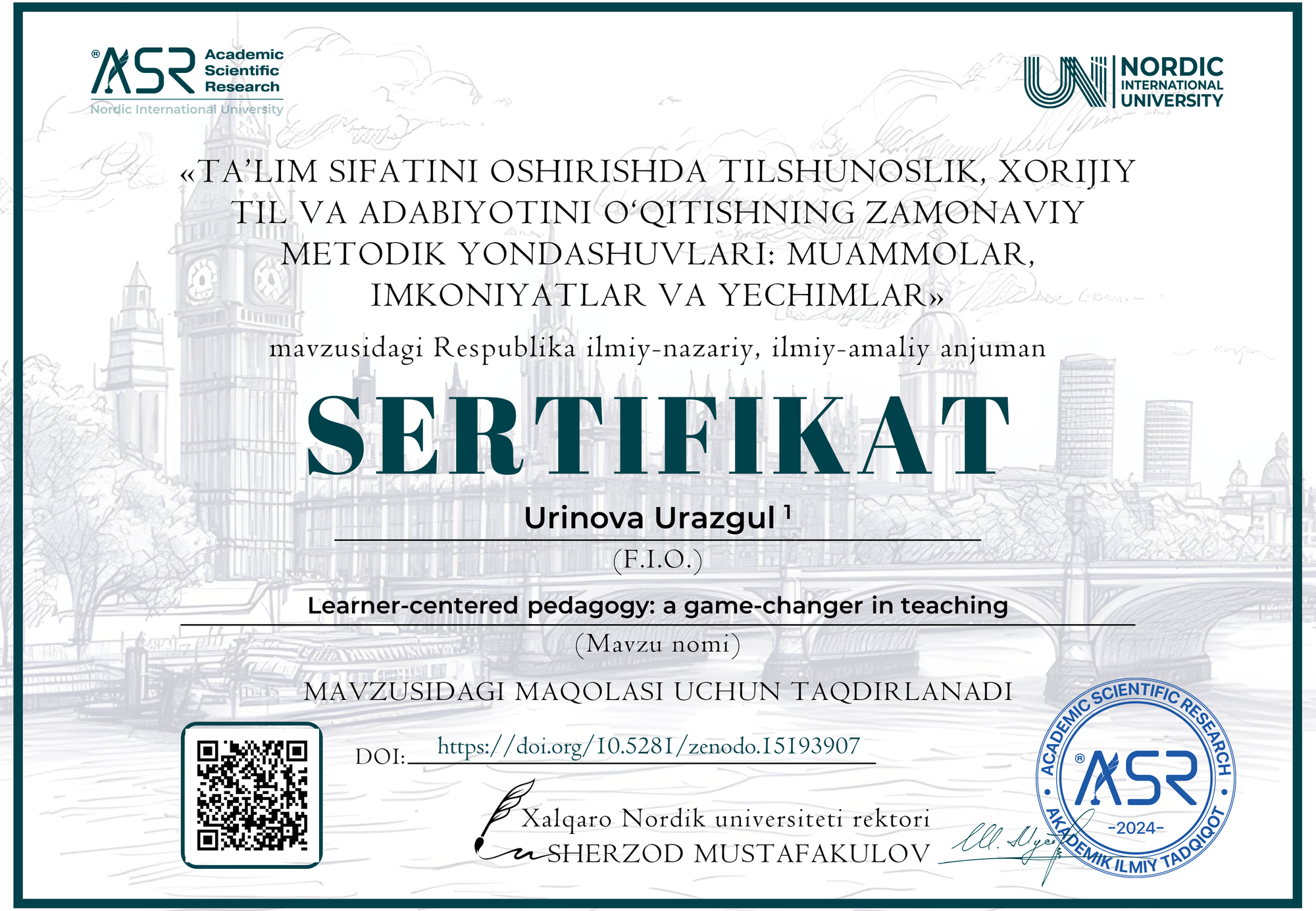Urinova Urazgul 1

DOI: https://doi.org/10.5281/zenodo.15193907
Google scholar: https://scholar.google.com/scholar?hl=ru&as_sdt=0%2C5&q=%22LEARNER-CENTERED+PEDAGOGY%3A+A+GAME-CHANGER+IN+TEACHING%22&btnG=
Zenodo community: https://zenodo.org/records/15193907
Nordic_press journal: https://research.nordicuniversity.org/index.php/nordic/article/view/2319
MAQOLANI YUKLAB OLISH
SERTIFIKATNI YUKLAB OLISH
REVIEW:
In this thought-provoking article, Urinova Urazgul explores the transformative potential of Learner-Centered Pedagogy (LCP), positioning it as a "game-changer" in the realm of education. The paper provides a comprehensive examination of the theoretical underpinnings of LCP, contrasting it with traditional teacher-centered methods, and addresses the practical challenges of its implementation in various educational contexts. Drawing from multiple scholarly sources, the article asserts that LCP can significantly enhance student engagement, foster critical thinking, and cultivate a lifelong passion for learning—skills essential for thriving in an increasingly dynamic world.
Theoretical Foundations of LCP
The article begins by outlining the core theoretical frameworks supporting LCP, notably constructivism, humanistic psychology, and social learning theory. The works of Jean Piaget and Lev Vygotsky are highlighted to emphasize the active role of learners in constructing their own knowledge. Piaget’s cognitive constructivism and Vygotsky’s social constructivism both underscore the importance of learner autonomy and social interaction in the educational process. In addition, humanistic psychology, with contributions from Carl Rogers and Abraham Maslow, further solidifies LCP by emphasizing the emotional and developmental aspects of learning. By grounding LCP in these well-established theories, the article reinforces the pedagogy’s foundation in fostering holistic learner development.
Urinova successfully contrasts LCP with traditional education models, which often prioritize passive learning through lectures and standardized curriculum. In contrast, LCP promotes active participation, inquiry-based activities, and metacognitive reflection, emphasizing the development of critical thinking and problem-solving skills. This shift is not only theoretical but is also evidenced in the changing dynamics of classroom interaction, where students are viewed as active agents in their learning journey rather than passive recipients of knowledge.
Implementation Challenges
While the theoretical advantages of LCP are well-documented, the article also addresses the practical obstacles to its widespread implementation. One of the primary challenges is resistance from educators, particularly those who are unfamiliar with or untrained in facilitative teaching methods. Traditional pedagogical models, which rely on teacher-centered instruction and rigid curricula, create barriers to the adoption of more flexible, student-centered approaches. Additionally, large class sizes and the prevalence of standardized testing frameworks, which emphasize summative rather than formative assessment, complicate the adoption of LCP.
Urinova emphasizes the need for systemic reforms to overcome these challenges, including professional development for teachers, curricular flexibility, and the introduction of alternative assessment models. The article also highlights the socio-cultural factors that may influence students’ receptiveness to interactive and autonomous learning methods. These cultural barriers often stem from long-standing educational practices that prioritize passive learning, and addressing them requires a shift not only in pedagogical strategy but also in cultural attitudes toward education.
Conclusion
The article concludes by reiterating the transformative potential of LCP. It presents LCP not just as a pedagogical trend but as a fundamental paradigm shift that redefines the roles of both educators and students. The benefits of LCP—such as enhanced engagement, critical thinking, and collaborative skills—are crucial for preparing students for the complexities of the modern world. However, to realize the full potential of LCP, the article argues that significant reforms are necessary, including teacher training, curriculum adaptation, and legislative support for alternative assessment models.
Urinova’s exploration of LCP is insightful and timely, offering a balanced perspective that acknowledges both the promise and the challenges of implementing such a progressive pedagogy. The paper is an important contribution to the ongoing discourse on educational reform, providing valuable insights for policymakers, educators, and researchers interested in advancing learner-centered approaches in the classroom. Future research, particularly longitudinal studies on the academic impact of LCP and hybrid teaching models, is encouraged to further validate the efficacy of this pedagogical shift.



